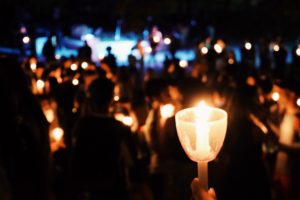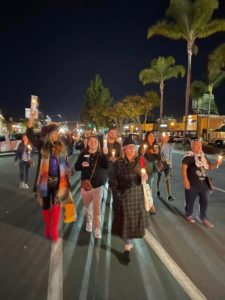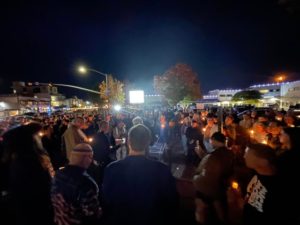San Diegans March Against Hate

On that cold November evening, just a day after the Club Q shooting in Colorado Springs, I stood before hundreds assembled in San Diego, and emceed an anti-hate rally.
“I’m done. I’m just done with hate and division…I am done with thoughts and prayers, and I am also done with the goddamn politicians who employ negative rhetoric against the LGBTQ community, using it to stir that hate and division.
“I am done with being a victim, I am done with accommodating the vulgar. We are done, and we aren’t doing this anymore. We are no longer going to put up with this. This is not who we are…We are a community based on love. Most communities are assembled by some immutable characteristic of race, ethnicity, religion, or national origin, but our community is based upon something different, partly in who we are, but more importantly based upon love and who we love…we are a patient community, but our patience is finite. We are a community that is based on love and a community that fights back when it is attacked and we fight hard.
“On a hot summer night in 1969, on the day that Judy Garland died, a group of us who were just done with being harassed and attacked by the police took up rocks and bottles at the corner of 14th and Christopher Streets in lower Manhattan, and you know what we remember that day as? Stonewall.
 “On a clear Tuesday morning in September of 2001, another one of us was done with the idea of being a passive victim. The rugby-playing gay man, Mark Bingham rallied his fellow passengers aboard Flight 93 and with the cry of ‘let’s roll’ heroically saved what may have been hundreds of other potential victims.
“On a clear Tuesday morning in September of 2001, another one of us was done with the idea of being a passive victim. The rugby-playing gay man, Mark Bingham rallied his fellow passengers aboard Flight 93 and with the cry of ‘let’s roll’ heroically saved what may have been hundreds of other potential victims.
“And then last night at Club Q in Colorado Springs, other members of our community were sick and tired of being victims of another brutality thrusted upon our community and they fought back. Unlike September 11th, 2001, last night’s terrorist—on the Transgender Day of Remembrance—was not foreign-born but domestic. From San Diego, with a grandfather serving in the state assembly who called January 6th the ‘new Lexington and Concord.’ The terrorist apple doesn’t fall far from the terrorist tree…
We are here not just to fight, but to come back together, to grieve, to heal. We are here to find strength in our community, to listen to our elected and community leaders, and to cry out that while we may be done with the current morass of bullshit, we have not yet begun to fight.”
Our first speaker, Commissioner Nicole Ramirez, a cornerstone of LGBTQ advocacy and activism spoke of resistance and resilience. The 100-strong Gay Men’s Chorus of San Diego slipped in behind the speakers and added a depth of soul to our rally by performing Holly Near’s “We Are Gentle Angry People”. There were speeches by Congresswoman Sara Jacobs (D-CA-53), transgender and drag queen activist Tootie Thomas, Right Reverend Susan Jester of St. Paul’s Episcopal Cathedral, and Eddie Reynoso, a local activist and director of San Diego’s Equality Business Association. Between each speech I shared quotes and said the name of each person murdered the past evening.
“While some of us believe in an afterlife, for all of us, no one is truly gone until the last person remembers them. We can keep these wonderful people with us by saying their name. Please repeat after me, ‘Daniel Aston, we remember you.’”
And repeated for Kelly Loving, Derrick Rump, Ashley Paugh, and Raymond Green Vance.
 Three takeaways for Humanists: The first is that of the role of the Humanist Celebrant. As a celebrant for nearly two decades, I have found my role to go from helping couples become united in the marital contract to that of being a community leader. In those moments when your community needs you, you step in to ensure that their needs are met. To be of service to other people, to bring them together, to speak of the good, to stave off cynicism and provide hope through the common bonds of fellowship in the name of humanity’s greatest virtue—our capacity to marshal our anger and fear as a group toward that of a unified love, compassion, inclusion, and altruism. This is truly at the core of what humanism is. We can grieve and scream apart, but cannot truly heal without the company of each other.
Three takeaways for Humanists: The first is that of the role of the Humanist Celebrant. As a celebrant for nearly two decades, I have found my role to go from helping couples become united in the marital contract to that of being a community leader. In those moments when your community needs you, you step in to ensure that their needs are met. To be of service to other people, to bring them together, to speak of the good, to stave off cynicism and provide hope through the common bonds of fellowship in the name of humanity’s greatest virtue—our capacity to marshal our anger and fear as a group toward that of a unified love, compassion, inclusion, and altruism. This is truly at the core of what humanism is. We can grieve and scream apart, but cannot truly heal without the company of each other.
The second takeaway is the need to volunteer. When your community needs you and when something needs to be done, resist the impulse of hesitation. If you wait until the time is right, conditions will never reach that point and you will still be standing on the sidelines, sidelined by your own lack of trust in yourself. You have more power than you know.
The final takeaway is the importance of inclusion. The greatest torture that we can inflict on another human being is isolation. Through alienation and exclusion comes violent retaliation. Shunning begets resentment. Racism, homophobia, misogyny, ethnocentrism, and the whole constellation of animus affect does not derive itself from rational thought. It comes from something far more primal and quite visceral. Part vestigial, part conditioned, the deliberative processes of one’s cognition rarely portend to thoughtful prejudice. Exclusion breeds rash, antisocial behavior. It is our responsibility to bring people together no matter how messy.
“I know you are angry; I know that some of you are afraid. But I want to say something to you all. If you have ever felt like you are alone, that you are weird, that you are isolated, that you just don’t fit in; I want to point out something to the contrary. Look around you. Look at each person standing near you, and near them. I want you to realize that it’s not just you out there. You are not alone, you are part of something bigger, you are a part of this community. You aren’t alone, you belong, you belong here!”
As I started this essay, I am done. I am done with hatred, division, and now, typing this piece. I may be done with this, but I have not yet begun to fight and I extend my hand.
Will you join me?
